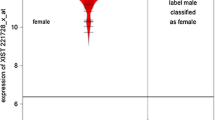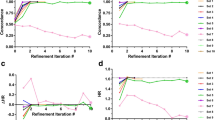Abstract
Research in cancer genomics has proliferated with the advent of microarray technologies. These technologies facilitate monitoring of thousands of genes in parallel, thus providing insight into disease subtypes and gene functions. Gene expression data obtained from microarray chips are typified by few samples and a large number of genes. Supervised classifiers such as support vector machines (SVM) have been deployed for prediction task. However, insufficient labeled data have resulted in a paradigm shift to semi-supervised learning, in particular, transductive SVM (TSVM). Analysis of gene expression data using TSVM revealed that the performance of the model degenerates in the presence of unlabeled data. We address this issue by using a representative sampling strategy which ensures safety of the classifier even in the presence of unlabeled data. We also address the issue of privacy violation when classifier is shipped to other medical institutes for analysis of shared data. We propose a safety aware and privacy preserving TSVM for classifying cancer subtypes. Performance of TSVM with SVM and accuracy loss of the proposed TSVM are also analyzed.
Similar content being viewed by others
References
Bair, E., Tibshirani, R.: Semi-supervised methods to predict patient survival from gene expression data. PLoS Biol. 2, E108 (2004)
Camara, F., Samb, M.L., Ndiaye, S., Slimani, Y.: Privacy preserving RFE-SVM for distributed gene selection. Int. J. Comput. Sci. Issues 154–159 (2012)
Deepthi, P.S., Thampi, S.M.: Predicting cancer subtypes from microarray data using semi-supervised fuzzy C-means algorithm. J. Intell. Fuzzy Syst. 32(4), 2797–2805 (2017)
Ein-Dor, L., Zuk, O., Domany, E.: Thousands of samples are needed to generate a robust gene list for predicting outcome in cancer. Proc. Natl. Acad. Sci. 103(15), 5923–5928 (2006)
Eisen, M.B., Spellman, P.T., Brown, P.O., Botstein, D.: Cluster analysis and display of genome-wide expression patterns. Natl. Acad. Sci. 95(25), 14863–14868 (1998)
Guo, S., Zhong, S., Zhang, A.: Privacy preserving calculation of fisher criterion score for informative gene selection. In: 2014 IEEE International Conference on Bioinformatics and Bioengineering (BIBE), pp. 90–96. IEEE (2014)
Haferlach, T., Kohlmann, A., Wieczorek, L., Basso, G., Te Kronnie, G., Bn, M.C., De Vos, J., Hernndez, J.M., Hofmann, W.K., Mills, K.I., Gilkes, A.: Clinical utility of microarray-based gene expression profling in the diagnosis and subclassifcation of leukemia: report from the International Microarray Innovations in Leukemia Study Group. J. Clin. Oncol. 28(15), 2529–2537 (2010)
Hruschka, E.R., Covoes, T.F.: Feature selection for cluster analysis: an approach based on the simplified Silhouette criterion. In: 2005 International Conference on Intelligent Agents, Web Technologies and Internet Commerce, pp. 32–38 (2005)
http://orange.biolab.si.datasets.psp. Accessed 6 June 2014
Jiang, D., Tang, C., Zhang, A.: Cluster analysis for gene expression data: a survey. IEEE Tran. Knowl. Data Eng. 16, 1370–1386 (2004)
Li, X.: Privacy preserving clustering for distributed homogeneous gene expression data sets. In: Innovations in Data Methodologies and Computational Algorithms for Medical Applications, pp. 184–207. IGI Global (2012)
Lin, K.P., Chen, M.S.: On the design and analysis of the privacy-preserving SVM classifier. IEEE Trans. Knowl. Data Eng. 23(11), 1704–1717 (2011)
Maulik, U., Mukhopadhyay, A., Chakraborty, D.: Gene-expression-based cancer subtypes prediction through feature selection and transductive SVM. IEEE Trans. Biomed. Eng. 60(4), 1111–1117 (2013)
Salazar, R., Roepman, P., Capella, G., Moreno, V., Simon, I., Dreezen, C., Lopez-Doriga, A., Santos, C., Marijnen, C., Westerga, J., Bruin, S.: Gene expression signature to improve prognosis prediction of stage II and III colorectal cancer. J. Clin. Oncol. 29, 17–24 (2010)
Zhang, X., Guan, N., Jia, Z., Qiu, X., Luo, Z.: Semi-supervised projective non-negative matrix factorization for cancer classification. PloS ONE 10(9), e0138814 (2015)
Acknowledgments
The research was financially supported by Department of Information Technology, Government of Kerala and the facilities were provided by Indian Institute of Information Technology and Management - Kerala.
Author information
Authors and Affiliations
Corresponding author
Editor information
Editors and Affiliations
Rights and permissions
Copyright information
© 2017 Springer International Publishing AG
About this paper
Cite this paper
Deepthi, P.S., Thampi, S.M. (2017). A Privacy Preserving and Safety-Aware Semi-supervised Model for Dissecting Cancer Samples. In: Nguyen, N., Papadopoulos, G., Jędrzejowicz, P., Trawiński, B., Vossen, G. (eds) Computational Collective Intelligence. ICCCI 2017. Lecture Notes in Computer Science(), vol 10449. Springer, Cham. https://doi.org/10.1007/978-3-319-67077-5_13
Download citation
DOI: https://doi.org/10.1007/978-3-319-67077-5_13
Published:
Publisher Name: Springer, Cham
Print ISBN: 978-3-319-67076-8
Online ISBN: 978-3-319-67077-5
eBook Packages: Computer ScienceComputer Science (R0)




